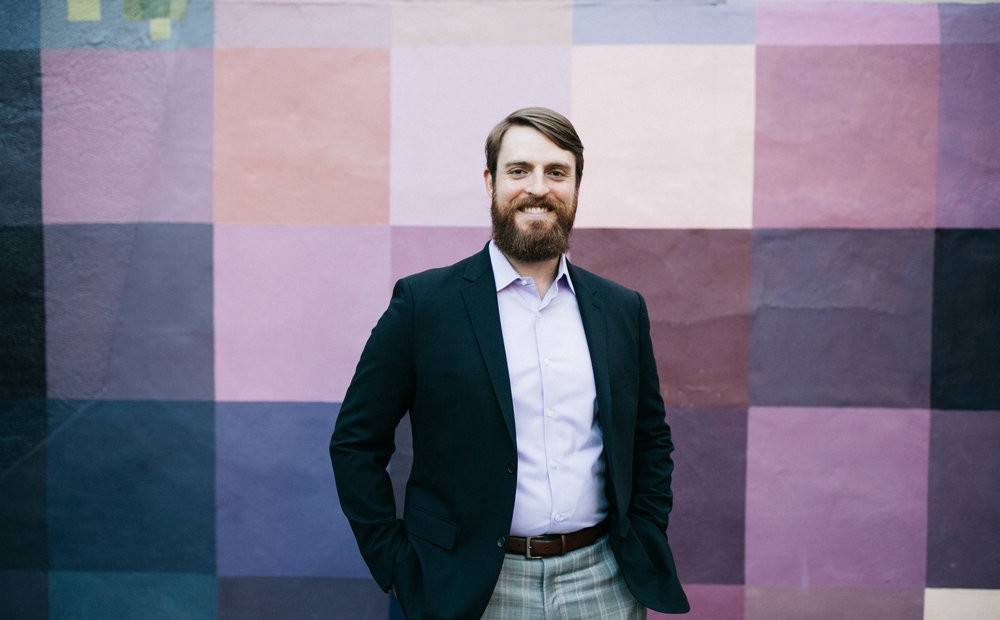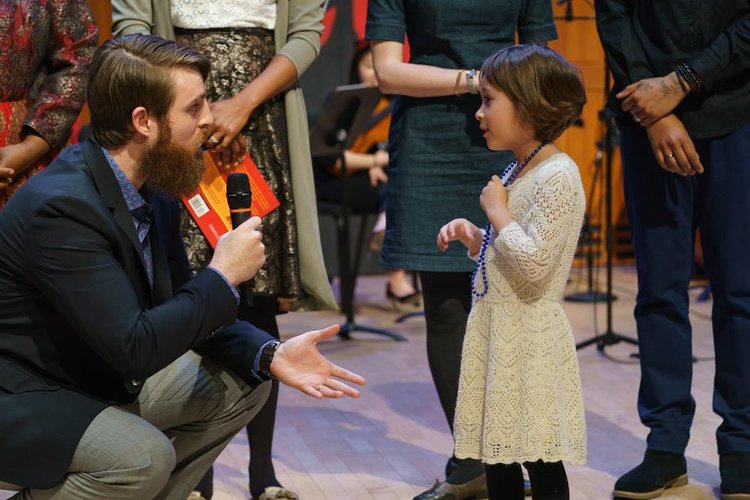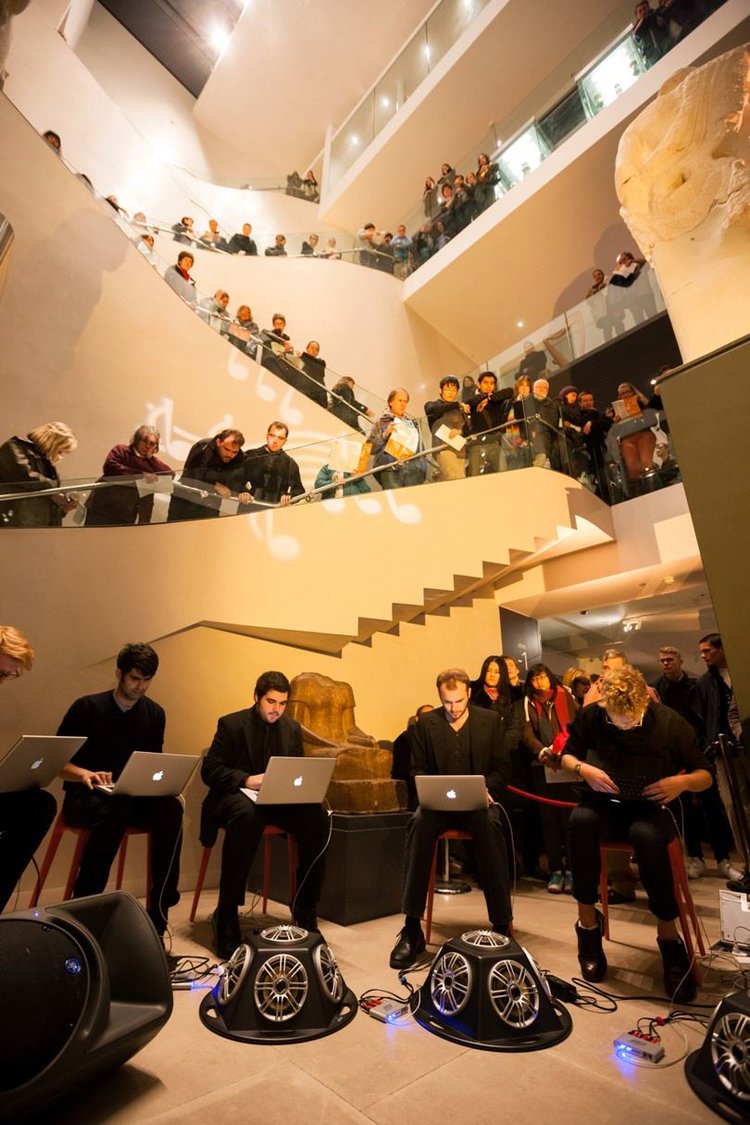Faculty Interview: Nick DiBerardino—Part Two

Read part one of Nick DiBerardino’s interview HERE.
From your formative years to the world of academia and beyond, who or what are the most significant influences in your musical development and career as a composer?
 Composers often respond to that question by talking about musical influences. Debussy was a huge influence on my music. I find the idea of using scales as a generative harmonic engine that produces color and tension over time incredibly useful. I think the surface of my music is a little bit more, maybe, Beethoven, than it is Debussy, but the conceptual connection is there. I grew up listening to and learning a lot of romantic music—a lot of Grieg, for some reason. I did not play any Bach until I got to college, and I was mostly self-taught as a musician, so there is this kind of romanticism that’s latent in my musical personality that comes out sometimes. Jazz harmony, in particular the modal jazz of a composer like Miles Davis, is another important influence. Steely Dan was my favorite band growing up. Their density, precision, and groove have stayed with me.
Composers often respond to that question by talking about musical influences. Debussy was a huge influence on my music. I find the idea of using scales as a generative harmonic engine that produces color and tension over time incredibly useful. I think the surface of my music is a little bit more, maybe, Beethoven, than it is Debussy, but the conceptual connection is there. I grew up listening to and learning a lot of romantic music—a lot of Grieg, for some reason. I did not play any Bach until I got to college, and I was mostly self-taught as a musician, so there is this kind of romanticism that’s latent in my musical personality that comes out sometimes. Jazz harmony, in particular the modal jazz of a composer like Miles Davis, is another important influence. Steely Dan was my favorite band growing up. Their density, precision, and groove have stayed with me.
I’ve been inspired by the career shapes of other composers. I was at Princeton as an undergrad while Caroline Shaw was there, where she was doing her doctorate when she won the Pulitzer. She has her own approach to music and didn’t really call herself a “composer” at the time, even though she was in the composition program. She talked about herself as a “musician,” and all the distinct aspects of her personal musical practices ultimately showed up in her work. She’s amazing and was following her insight and intuition toward what she believed in. There are so many other composers whose story is like this—John Luther Adams comes to mind, who was doing his own thing and was in the middle of nowhere following his heart and vision and belief that music can change the world. That might be a slightly idealized version of talking about his life and work, but I find it inspiring.
I like that moving towards personal authenticity is consonant with finding success as a composer, especially as someone coming from outside the classical world. When I was younger, I was very stressed about the idea that I didn’t know XYZ and ABC. Everybody else seemed to know certain things, and I felt like I was behind. But a lot of those things you can learn, which I have. What matters more at the end of the day is, I think, that sense of seeing a path for yourself aesthetically. That is a kind of influence I think has been especially important for me.
Watch Season 14 Episode 5 of WHYY’s On Stage at Curtis feature on Nick DiBerardino’s works from his graduation recital and Suite Talk with cellist Zachary Mowitz HERE, or click the video below.
How did your compositional studies here at Curtis shape the artist and leader you have become today?
My time as a Curtis student was transformative for me. When I came here, it was my third graduate degree in composition. Sometimes people ask me why I have all these pre-doctoral and postgraduate degrees, and the reality is that I just really wanted to continue studying. I love learning things and always appreciated the chance to focus on getting better. When I got to Curtis, I was approaching my work as a student—which of course is normal. But there is a disconnect between what it is like to be a student and a composer and what it’s like to be a professional composer in terms of mental outlook and daily habits. Curtis is uniquely good at connecting really talented young composers to this professional mindset of music-making, while still helping them grow their language.
Being at Curtis with so many incredible performers had a transformative impact on how I thought about composing and what I knew about it. The networking moments you experience here last your whole life. But more important than that, I think my outlook shifted a bit, and I started to believe that anything was possible—that I could aim very high for my own compositional career. I learned more about what that looked like from a practical, process perspective. I learned to work on commission and became more consistent with my compositional practice. More than anything, the chance to have such incredible musicians perform my work, and so often, including with the full orchestra, was really impactful. That made Curtis the most fantastic testing ground for creative ideas.
Watch Nick DiBerardino’s children’s opera Anansi and the Great Light HERE, or click the video below. The opera was recorded in Gould Rehearsal Hall at the Curtis Institute of Music on March 31, 2019.
How do you think the school inspires an entrepreneurial spirit in its students?
Well, I think that’s connected pretty closely to the whole “learn by doing” philosophy. For example, our student composers are able—because the department is small, well-resourced, and because it’s so artistically excellent—to execute all kinds of crazy, cool concepts, whether a piano concerto for the Spirio player piano or a composition with live electronics and some sort of theatrical element. Curtis provides its composition students with lots of different performance opportunities and the freedom to explore their ideas in a full way, from the germ of an idea all the way through to the performance. They are responsible for managing every stage of that process, including the performance scenario and any technology. They get to collaborate closely with our incredible A/V team and Drew [Schlegel, Curtis’s director of audio engineering] on all of those aspects. That’s an unusual amount of creative freedom, mentorship, access to resources, and also responsibility. I think that all relates closely to the idea of entrepreneurship.

Sometimes we think of entrepreneurship and artistry as different things, but they can be the same, especially for composing. This is definitely true for composers who create new artistic circumstances every time they work. But there are a lot of very practical career studies elements that are offered at Curtis, too. Curtis is where I learned to build a website, make recordings, record video, and write an artist statement. Those are essential aspects of entrepreneurship—knowing how to talk about your work, market your work, and record and document your work. CAP is a really amazing program—Curtis’s Community Artist Program, where some of our older undergrads and postgrads can design and implement a project with some seed funding and mentorship support. This is the philosophy behind our master’s degree as well. The graduate work in the new master’s degree is a mentored project, so the students can think about and design the kind of work that speaks to them in their creative practice. It could be academic writing. It could be a community engagement project. It could be almost anything. That’s a great example of learning entrepreneurship by actually doing something you care about. I had a chance to do that when I was at Curtis, and I think that’s when you learn the most—when you are really invested in what you’re doing and you care about it. I think that’s core to the Curtis philosophy.
You’ve recently taken on the roles of chair of composition studies, director of Ensemble 20/21, and now dean of Curtis. What’s been the most enjoyable aspect for you?
There’s so much that I love. First and foremost, working with Curtis students is unbelievably fulfilling. It’s a crazy, amazing thing to be, for example, invited into the creative process of our current composition students and be able to offer input, not just be a part of watching their careers from afar. It’s such a privilege. All our students—not just the composers—are inspiring, talented, and have such vision and capacity. One thing that’s fun about my new work [as dean] is that it gives me a reason to engage with everybody: all the students and our performance faculty. We have such an incredible community that even when I’m tasked with talking about everyone’s least favorite subject, something like release requests, it feels worthwhile. I don’t mind the hard work because the community is so inspiring to me in general.
Click HERE to watch Nick DiBerardino conduct his Ornithopter, or click the video below. The composition was performed on Saturday, March 25, 2017, at Curtis’s Gould Rehearsal Hall.
Any advice for young, burgeoning composers?
Well, based on the contents of this conversation here, it won’t surprise you where I would go with this answer; but it’s something I would say to a composer starting out. It’s really important to always work on craft and get better at the technical elements of composing, such as orchestration or harmony. In my opinion, it is important to emphasize that your ultimate success as a composer comes from having something to say and being authentic about saying it through music. To get there, you have to pay really close attention to what it is you love. If you love something and it doesn’t have a score, and you want to be able to notate something, transcribe it. Dig into that stuff you love, and figure out how it works. Look at scores and study the passages.
I think it’s more important to leave with your strengths than to try to patch your weaknesses as a composer because there’s not an agreed-upon set of stylistic norms that you have to conform to, which means you don’t have to be good at everything. You just have to be good at saying what it is that you want to say through your music.
Visit Nick DiBerardino’s official website HERE.
Read part one of Nick DiBerardino’s interview HERE.
Interview with Mr. DiBerardino by Ryan Scott Lathan.
ABOUT NICK DIBERARDINO
Composer Nick DiBerardino (’18) is noted for creating “richly textured, multilayered” sound worlds (Minnesota Star Tribune) that tell fantastical tales. He has written music about everything from failed flying machines and Star Trek to Walt Whitman and tall glasses of beet juice.
A Rhodes Scholar, Mr. DiBerardino has received commissions from many distinguished artists and institutions, including Symphony Tacoma, the Dover Quartet, Philadelphia Chamber Music Society, Sandbox Percussion, the New College Choir, arx duo, Lake Champlain Chamber Music Festival, Music From Angel Fire, and saxophonist Matthew Levy. His works have been performed around the world by the American Composers Orchestra, the Minnesota Orchestra, Aizuri Quartet, Contemporaneous, So Percussion, and many others.
Mr. DiBerardino founded England’s first laptop orchestra, OxLOrk, and has designed several collaborative composition initiatives, including a children’s opera composed with students at Girard College and a workshop series for people living with Alzheimer’s disease, created in partnership with the Penn Memory Center.
Mr. DiBerardino is the chair of composition studies at the Curtis Institute of Music, where he also serves as director of Ensemble 20/21 and dean. He holds composition degrees from the University of Oxford, the Yale School of Music, the Curtis Institute of Music, and Princeton University.
Photo Credits: 1.) Gene Smirnov 2 & 3.) Courtesy of Nick DiBerardino’s official website. 4.) OxLOrk, Oxford University’s Laptop Orchestra performing in the U.K.; courtesy of Nick DiBerardino’s official website.


